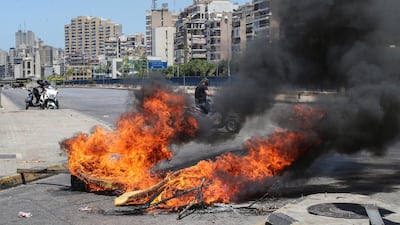Lebanon’s military chief on Thursday appealed to the international community to provide support for the army, warning that its “collapse” will fuel chaos and insecurity as Lebanon grapples with its worst economic and financial crisis.
General Joseph Aoun told representatives of major powers at a French-sponsored conference to secure assistance for the army that the military needs the international community’s urgent support to maintain its cohesiveness and keep carrying out its duties.
The crisis, which the World Bank has called one of the world’s most severe since the 1850s, has plunged over half the country’s population into poverty, with the national currency losing over 90 per cent of its value since late 2019.
“Lebanon is facing an unprecedented economic crisis and the lack of solutions in the near future has become evident,” General Aoun said, cautioning that if the army were to disintegrate, Lebanon, as an entity, would also collapse and “chaos will spread”.
The economic crisis, which has been further accentuated by political paralysis, has eroded the army’s personnel purchasing power and weighed heavily on morale.
“The deteriorating economic and financial situation in Lebanon will inevitably lead to the collapse of institutions, including the military, and therefore the entire country’s security will be exposed," General Aoun warned. “It is therefore important to support soldiers on the individual level…in addition to supporting the institution as a whole."
Soldiers who earn on average 1.2 million pounds a month - now the equivalent of around $80 - are struggling to make ends meet, General Aoun warned earlier this year.
The army said last year it had scrapped meat from the meals it offers to on-duty soldiers over rising food prices.
French Defence Minister Florence Parly said the conference was aimed at empowering the army to maintain stability and security.
The economic crisis’ heavy toll on the country’s armed forces prompted General Aoun to criticise the country’s political class earlier this year in rare remarks by a sitting military official.
“Where are we are heading? What are your plans?” he asked politicians in March as demonstrators blocked roads and burned tyres across the country to protest against a record plunge in the Lebanese pound.
The army chief has since sought to rally Lebanon’s traditional allies, led by the US and France, to provide support for the army. His latest endeavour featured a visit to France where he met with President Emanuel Macron at the Elysee Palace, days before Paris announced the conference in support of the military.
Mr Macron recently said he was working with international partners to create a financial path to ensure important public services can continue to operate in Lebanon despite the crisis.
The crisis has led to disruptions in vital infrastructure services with power blackouts, water shortages and internet outages increasing in frequency in recent weeks as the government struggles to secure fuel imports to power up electricity plants.
Dwindling foreign currency reserves have also led to acute shortages in fuel supplies for private generators that make up for state power rationing, while hospitals have been running low on medical supplies and equipment.
Despite deepening economic woes, Lebanon remains without a fully functioning cabinet since last August’s massive explosion at Beirut port. The blast killed over 200 people and destroyed thousands of properties across the capital further compounding the economic crisis.
Nine months later, the country’s political leaders remain at loggerheads over the upcoming government’s makeup and reform agenda.
The political deadlock prompted French Foreign Minister Jean Yves Le Drian to warn Lebanese officials during a visit to Beirut last month that his government was preparing sanctions on officials they blame for obstructing the formation of a new Cabinet.








